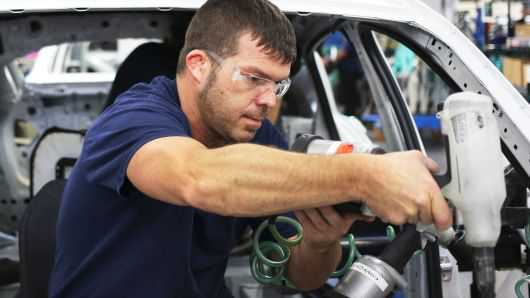German automakers BMW, Daimler stand to benefit the most if China cuts US auto tariffs
13 December, 2018

An employee installs interior accessories inside a BMW X4 sports utility vehicle on the assembly line at the BMW assembly plant in Greer, South Carolina.
If China follows through on recent reports it will lower tariffs on U.S.-made autos, the real cheers may be coming from Berlin, not Detroit.
Chinese Vice Premier Liu He reportedly said Beijing would cut the tariff on autos imported from the U.S from 40 percent to 15 percent during a call on Monday with U.S. Trade Representative Robert Lighthizer and Treasury Secretary Steven Mnuchin.
It is a step toward cooling the rising trade tensions between the two countries, but its actual effect on U.S. automakers may be limited, said Kristin Dzichek, an analyst with the Center for Automotive Research. It may actually matter more to foreign automakers with factories in the U.S. than for Ford and General Motors. American manufacturers have been hit hardest by the tariffs on imported metals, which have jacked up materials costs for cars built in the U.S.
With the notable exception of electric carmaker Tesla, U.S. automakers tend to build where they sell.
Both Ford and General Motors have joint ventures set up in China and manufacture cars there for that market. Ford exports more of its cars to China than GM, Dzichek said, because it has less of a footprint in the country. While both automakers export some specialty vehicles, that includes lower-volume sports cars such as the Ford Mustang and the Chevrolet Corvette as well as some luxury vehicles.
But by far the largest number of U.S.-made cars shipped to China bear German names.
German automakers have been getting hit particularly hard from both sides of the international trade war. They are the largest exporters of China-bound sport utility vehicles from the U.S. and significant importers of luxury sedans into the U.S., said Jeff Schuster, the president of global forecasting for LMC Automotive.
Munich-based BMW and Daimler, headquartered in Stuttgart, Germany, are the largest and second-largest U.S. exporters to China, respectively. The number of cars they ship each year far surpasses Ford and Tesla.
Last year, BMW exported 65,000 vehicles to China from its factory in Spartanburg, South Carolina, which is BMW's largest factory in the world. Daimler, which owns Mercedes-Benz, exported 57,000 autos from its plant in Alabama. Ford, Fiat-Chrysler and Tesla exported just over 75,000 cars, combined.
Both German firms have warned their profits may take a hit this year from the trade war. Tesla, which produces all of its cars at its Fremont, California, factory, is speeding up production of a plant in Shanghai to get around the tariffs, CEO Elon Musk told analysts in October.
If China follows through — and that is not yet a certainty — it could provide some relief to Tesla as well as the German automakers and Americans who work in their factories in South Carolina, Tennessee and Alabama.
"Taking the tariff back down from 40 percent to 15 percent should normalize sales up and secure jobs in the U.S.," Jefferies analyst Philippe Houchois told CNBC.
But even if that happens, it's unclear whether President Donald Trump will reduce his own tariffs on imported steel and aluminum. The U.S. is currently imposing a 10 percent duty on imported aluminum and a 25 percent duty on imported steel. Ford CEO Jim Hackett complained earlier this year that the tariffs had eaten $1 billion of the company's profits.
Representatives from Ford, GM and BMW all said they see the talks as a step in the right direction and urge both the U.S. and China to work out a sustainable trade deal.
Some foreign automakers are feeling the pinch. In addition to BMW and Daimler, Volkswagen has a plant in Chattanooga, Tennessee, which makes SUVs for the U.S. market.
"The ones that produce in the U.S. are definitively complaining about rising raw material prices," said Metzler analyst Juergen Pieper.
